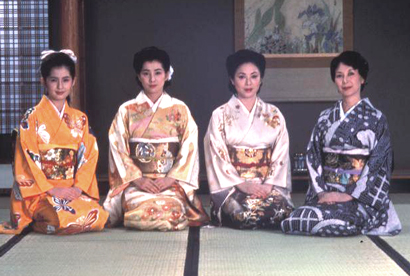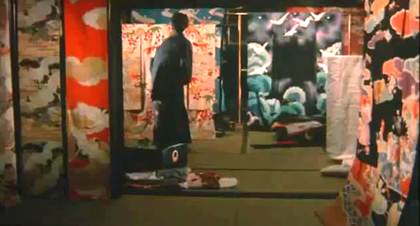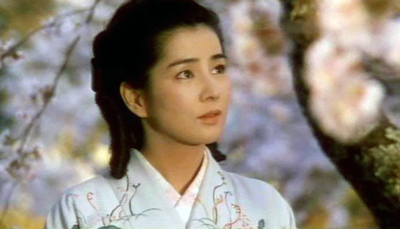
 |
|
|
|
Truly absorbing family epics are becoming scarce in American films, but this 1983 adaptation of a classic Japanese novel by Junichiro Tanizaki carries the tradition proudly forward. It's said to be the best of three film versions, and it became a late career masterpiece for director Kon Ichikawa, who earlier made bitter and philosophical movies about the militaristic politics of the same time period. Set in the western mercantile hub Osaka during the pre-war depression, The Makioka Sisters is about a once-prosperous family's awkward adjustment to changing times and the conflicts arise when privilege and tradition run up against modern realities. Toho promoted it as the centerpiece of its 60th anniversary. 
With her parents gone, the eldest daughter, Tsuruko Makioka (Keiko Kishi of The Yakuza) sees herself as a reigning matriarch charged with protecting the family name. She clashes with her younger sisters and wins arguments with passive-aggressive bullying. The next younger sister Sachiko (Yoshiko Sakuma) may object, but is always overridden. Both older sisters are married to businessmen from less respectable families. Tsuruko's husband Tatsuo (Juzo Itami of Lord Jim and 55 Days at Peking) is a bank executive. He changed his name to Makioka as a condition of his marriage, as did Sachiko's husband Teinosuke (Koji Ishizaka). The main business of these women is to see their younger sisters married in a way that befits their station. Both of the younger women live with Sachiko. Shy and somewhat mysterious, Yukiko (Sayuri Yoshinaga) is pushing 30. When the family was wealthy no suitor was acceptable, and all the new prospects have drawbacks -- they're either too old or stuffy or dull, and it is discovered that one has mental illness in his family. The matchmaking game is complicated by formal meetings that can become social disasters. Tsuruko hires private detectives to investigate each possible husband but real duds slip through anyway. One dour widower who brings all his personal documents to a restaurant, and compares Yukiko to one of the fish at his hatchery. The youngest sister Taeko (Yuko Kotegawa) can't marry before Yukiko, and is assertive, adventurous and altogether too 'western' for the family. Five years ago she tried to elope with a boyfriend, and still sees him. A mix-up with a tabloid newspaper story resulted in Yukiko's name being substituted in the scandal, a debacle that was unfairly blamed on Tatsuo. Although Taeko has made a local name for herself as a designer of dolls, the family disapproves of her independence and won't support her. An intolerant aunt (Kuniko Miyake of Until the End of the World) threatens to disinherit her. 
Now Tatsuo says that his household will have to move to Tokyo, which for Tsuruko is a catastrophic indignity. Other tensions come to play as well. One of Taeko's boyfriends, dispossessed by his father, approaches Teinosuke with a blackmail attempt, threatening to disrupt Yukiko's latest and most promising matchmaking arrangement. And Sachiko has a problem she can discuss with no one, when she finds her sister Yukiko and her husband Teinosuke being too affectionate with one another. The Makioka Sisters is fascinating as a study of life in an upscale Japanese household, and much too rich in characterization and cultural context to be regarded as a mere soap opera. Their dress alternates between traditional finery and western styles that seem to come from Paris. A major war is underway in China, a conflict that stays at a slight remove from these bourgeois households -- we hear of young men relocating to Manchuria and see a soldier on a train, but the only fatality is the brother of a servant. The Makiokas deal with wartime shortages but have the luxury of remaining complacent. They are of course unaware of the steamroller of war that is on the way. The family "lives in the past" but that doesn't mean that its traditions will be swept away, even when Tokyo is burned to the ground. Although viewers unfamiliar with Japanese films might do well to prepare a quick "cheat sheet" with the main character names and relationships, the actors of The Makioka Sisters quickly distinguish themselves. Keiko Kishi's frequently imperious Tsuruko and Yoshiko Sakuma's more softhearted Sachiko are given marvelous shadings of emotion. Sayuri Yoshinaga makes Yukiko properly demure and remote, only to show deep feelings of solidarity with her family when her niece falls sick or when her aunt Tsuruko is overcome by emotion. Yuko Kotegawa's Taeko is given less detail, as we only find out near the end what kind of life she has been leading when away in her doll-making studio. But she's a mystery to the rest of the family as well. It's fascinating to see domestic issues, sisterly competition and even hints of sexual misconduct played out in a foreign cultural context. So restrictive is the code of behavior regarding emotional displays, that when a character loses control we wonder if the Makioka house is about to fall off its foundations. 
Author Tanizaki had a difficult time with severe wartime censorship that decreed that his book's emphasis on "soft, effeminate" values and "the individualistic lives of women" was grossly unpatriotic. The Makioka Sisters does single out these privileged folk at a time when much of Japan was on a slippery slope to societal disaster. In his essay for Criterion, Audie Bock mentions that Ichikawa played up to a 1983 domestic audience that wasn't interested in movies about tough times in the past -- the '80s in Japan being prosperous boom years. Even the trailer for The Makioka Sisters touts the film's fidelity to the book, a claim that holds up in terms of character conflicts and cultural details. But Bock and other commentators also say that the film's ending is much more positive, especially for the Yukiko character. Emphasized instead are poetic representations of the Makiokas' yearly pilgrimages to Kyoto to see the springtime blossoming of the flowers. Spread throughout the film are pastoral scenes of exquisite beauty, and several scenes feature dazzlingly beautiful silk kimonos that Tsuruko says can no longer be found, even in 1938. Mr. Bock likens The Makioka Sisters to a Japanese Gone With the Wind, in that both are nostalgic paeans to eras long gone. Criterion's Blu-ray of The Makioka Sisters is a beautiful HD rendering of Ichikawa's fine film -- it's a pleasure to watch. The big bursts of color are reserved for the bright kimonos and the occasional cuts to exteriors of apple blossoms and shaded tree-lined lanes. Special color effects are used infrequently but to good purpose, as when a huge wedge of red entering a dark frame is revealed to be Taeko's face, in her lover's photographic dark room. And although it's mostly an effect of performance, we have plenty of time to ponder Yukiko's mesmerizing face when she gives Teinosuke and even a soldier on a train looks of hypnotic seduction that would provoke a wooden statue. She's as enigmatic as one of Taeko's fancy dolls. The Blu-ray and DVD editions of this lengthy show have a lower price than we'd expect, probably because Criterion has not licensed any of its usual expensive extras. Besides the exquisite restored HD transfer and the original trailer, film scholar Audie Bock's excellent insert booklet essay is the sole frill on this disc. When you've seen this year's one or two really interesting summer movies and are looking for a show that will stay in the memory for days afterwards, I heartily recommend The Makioka Sisters.
On a scale of Excellent, Good, Fair, and Poor,
The Makioka Sisters Blu-ray rates:
Footnote:
1. As I'm bound to make mistakes and am not going to be impressing anybody with my language skills anyway, I've dispensed with the appropriate diacritical marks for the Japanese names in this review: Juzo Itami is supposed to be written as Jûzô Itami, I think. The next time my writing conscience Stuart Galbraith IV visits from Japan, I'll take my punishment without complaint.
Reviews on the Savant main site have additional credits information and are often updated and annotated with reader input and graphics. Also, don't forget the 2010 Savant Wish List. T'was Ever Thus.
Review Staff | About DVD Talk | Newsletter Subscribe | Join DVD Talk Forum |
| ||||||||||||||||||